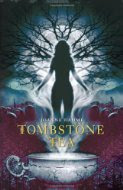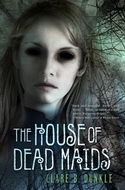Fehlbaum, Beth. Hope in Patience. Lodi, NJ: WestSide Books, 2010. Print.
[Book cover credit: librarything.com/work/10522298/]
Awards:
Nominated for YALSA Quick Pick's for Reluctant Readers, 2010
Booktalk:
Finally out of her step-father's house where she suffered through years of sexual abuse at his hands, Ashley is adjusting to life in Patience, Texas. In Patience she has a father, a real father, who wants to protect her, a step-mother who doesn't see her as "the competition," a little brother who
will play his video games so loudly that he entire house shakes, and a therapist who refuses to let her wallow in her past. Basically, she has a chance at a normal life. But with the coming trial against her step-father, her own flashbacks, and a seriously misguided rumor mill threatening to drag her down, Ashley may never be able to focus on the "normal" problems she
should be worrying about at her age: her last place status on the cross-country team, a group project with one of the most uncooperative group members ever, and whether or not a certain boy can look past everything else going on in Ashley's life and just
like her.
Review:
This is a harsh story, and my heart broke for Ashley over and over again while I was reading it. It is not a book that will be immediately accessible to a wide audience. It is a book that shows how one young woman is able to overcome years of sexual and emotional abuse with the help of some solid family and friends, and as such, it it has the power to provide exactly what the title suggests, hope, if it gets into the right hands.
Ashley's abuse at the hands of her step-father is definitely a focal point of
Hope in Patience, even though it is all in the past at the opening of the book (though it does still manage to be graphic in places). Her mother's emotional abuse, however, manages to still reach Ashley in Patience and still tear Ashley to bits. It is that, more than facing her step-father at trial that puts up roadblocks on Ashley's road to normalcy. It is also what makes it so hard for Ashley to trust that her father and step-mother really love her, want her around, and have her best interest at heart.
Ashley's father, David, wasn't around when she was a kid. He had been an alcoholic, prompting her mother to leave him and take Ashley with her. Rather than wallow in the realization that he could have saved Ashley from years of abuse had he just looked her up and been a part of her life, he steps up and welcomes Ashley to his house and home with open arms. He becomes the best supportive dad a girl could ask for, and though Ashley's trust issues (and his prior absence) make her unable to call him "Dad," it is clear that he quickly becomes one of the foundation pieces in her growing support system in in her new life.
Bev, David's wife, is also instrumental to Ashley's increasingly happy life in Patience. She steps right into the role of the mother Ashley never had, without pause and without question. Bev becomes Ashley's confidant and friend (and English teacher), and when the time comes when Ashley needs someone to tell her to just get over it already, Bev's the one to do it.* For clarification, No one ever implies that Ashley should just get over years of abuse. Ever. She has an amazingly patient and supportive family and therapist who all understand that these things take (a lot of) time. But! Whenever anything bad happens, anything at all, Ashley has a tendency to close in on herself and shut out the world.
This is what Bev tells her to get over, in a completely not-angry, non-judgemental way.
But the real star is, of course, Ashley. She's scared, kind, bold, shy, and overly aware of herself in the way that folks in therapy often are. And she's funny. And not broken. Fehlbaum, in Ashley, has managed to show that a person can go through hell and back, be totally and in some ways irrevocably scarred, and still not lose what make them
them. Ashley displays fierce loyalties to her friends, K.C. and Z.Z. especially, even when she's struggling to hold herself together. And they do the same for her when she needs it the most. And there's Joshua. He's cute, he's also on the track team, and he like Ashley, which in a lot of ways terrifies her. Learning to trust him with all of her issues is the Big Thing in this book. It's the Big Problem and also the Big Indication of Growth. It's also really sweet.
Hope in Patience is ultimately about how Ashley grows out of the shell that years of abuse put her in. It is the powerful story of how she stops being Ashley-who-was-abused and becomes just Ashley.
Hope in Patience will be out in hardback on October 27th!
Book source: ARC provided by the publisher.
*Bev also assigns controversial (Chris Crutcher) books in her classes, allows kids to hang out in her classroom before and after school, accepts "edgy" freaks and religious zealots alike, and is basically all kinds of awesome. And she's backed up by the sassy, southern principal's secretary, making her exponentially more powerful in her school setting. Bev is basically who I want to be when I grow up, except I want to be in a library rather than a classroom. :)









